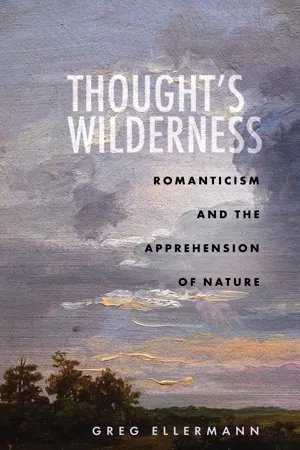
- 200 pages
- English
- ePUB (mobile friendly)
- Available on iOS & Android
About this book
While much recent ecocriticism has questioned the value of nature as a concept, Thought's Wilderness insists that it is analytically and politically indispensable, and that romanticism shows us why. Without a concept of nature, Greg Ellermann argues, our thinking is limited to the world that capitalism has made.
Defamiliarizing the tradition of romantic nature writing, Ellermann contends that the romantics tried to circumvent the domination of nature that is essential to modern capitalism. As he shows, poets and philosophers in the period such as Immanuel Kant, G. W. F. Hegel, Mary Wollstonecraft, William Wordsworth, and Percy Shelley were highly attuned to nature's ephemeral, ungraspable forms: clouds of vapor, a trace of ruin, deep silence, and the "world-surrounding ether." Further, he explains how nature's vanishing—its vulnerability and its flight from apprehension—became a philosophical and political problem. In response to a nascent industrial capitalism, romantic writers developed a poetics of wilderness—a poetics that is attentive to fleeting presence and that seeks to let things be. Trying to imagine what ultimately eludes capture, the romantics recognized the complicity between conceptual and economic domination, and they saw how thought itself could become a technology for control. This insight, Ellermann proposes, motivates romantic efforts to think past capitalist instrumentality and its devastation of the world.
Ultimately, this new work undertakes a fundamental rethinking of the aesthetics and politics of nature.
Frequently asked questions
- Essential is ideal for learners and professionals who enjoy exploring a wide range of subjects. Access the Essential Library with 800,000+ trusted titles and best-sellers across business, personal growth, and the humanities. Includes unlimited reading time and Standard Read Aloud voice.
- Complete: Perfect for advanced learners and researchers needing full, unrestricted access. Unlock 1.4M+ books across hundreds of subjects, including academic and specialized titles. The Complete Plan also includes advanced features like Premium Read Aloud and Research Assistant.
Please note we cannot support devices running on iOS 13 and Android 7 or earlier. Learn more about using the app.
Information
Table of contents
- Cover
- Title Page
- Copyright
- Dedication
- Table of Contents
- Figures
- Acknowledgments
- Introduction
- 1. Romanticism and Real Abstraction
- 2. Kant’s Remaining Time
- 3. Hegel in and Out of the Woods
- 4. Wollstonecraft in Ruins
- 5. Accidental Revelation in Words worth
- 6. Shelley’s Ethereal Poetics
- Notes
- Works Cited
- Index